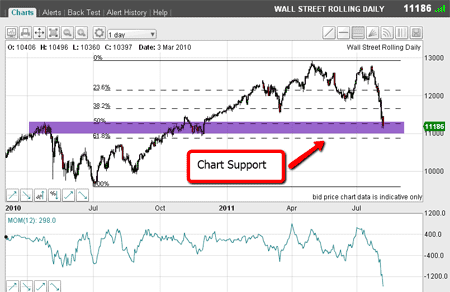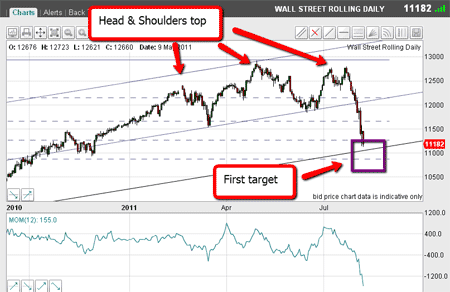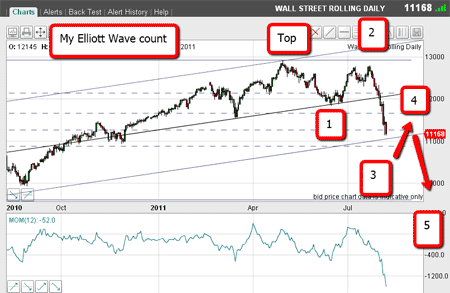This is a bear market – investors must rethink their strategies
The natural instinct of many traders is to go long. But now that we are in a severe bear market for stocks, traders must go against their emotions and embrace going short, says John C Burford.
Get the latest financial news, insights and expert analysis from our award-winning MoneyWeek team, to help you understand what really matters when it comes to your finances.
You are now subscribed
Your newsletter sign-up was successful
Want to add more newsletters?

Twice daily
MoneyWeek
Get the latest financial news, insights and expert analysis from our award-winning MoneyWeek team, to help you understand what really matters when it comes to your finances.

Four times a week
Look After My Bills
Sign up to our free money-saving newsletter, filled with the latest news and expert advice to help you find the best tips and deals for managing your bills. Start saving today!
Today, I am covering a very important subject that most traders/investors either ignore or are completely unaware of trader bias.
All traders have biases. We are only human.
One of mine happens to be looking for bear markets, or declines in bull markets. I am happier trading from the short side (looking for declines) than the long (looking for rallies). That is my basic nature.
MoneyWeek
Subscribe to MoneyWeek today and get your first six magazine issues absolutely FREE

Sign up to Money Morning
Don't miss the latest investment and personal finances news, market analysis, plus money-saving tips with our free twice-daily newsletter
Don't miss the latest investment and personal finances news, market analysis, plus money-saving tips with our free twice-daily newsletter
This is probably because I cut my investing/trading teeth in the US commodity futures markets, where being short a future is as natural as going long.
I quickly discovered that bear moves are often much sharper than bull moves. And being of an impatient disposition, that suited me down to the ground I can make faster profits in down markets!
This means I am always biased towards looking for tops in bull markets my recent flirtation with gold is a case in point: My gold call was wrong but I escaped without a loss.
Sadly, I have been unable to bring myself to go long on gold, and have missed out on some terrific profits.
Get comfortable with shorting
Now, I would say most spread betters in the UK have migrated from a stock-owning culture, where being long is virtually the only way to play the market.
It is the bias sold by the stock market industry and has generally served the public well since World War II. Stock prices have out-performed most other investments for decades.
Owning shares has been a wonderful means of increasing wealth, but now the game has changed.
My guess is that most of you have a long-only bias. You probably find that being short feels uncomfortable and unnatural.
I will make this bold statement: this feeling will severely hamper your profit-making abilities in today's new bearish environment.
My personal belief is that we have now entered a severe bear market, so learning how to emotionally adjust to being short is imperative for your trading success.
Buying the dips will be like catching a falling knife. I will be in my element shorting falling markets.
Trading Tip: What are your own trading biases? Do you tend towards the long side? Do you ever make short trades? Are your long trades consistently better than your short trades? Do you dislike the idea of selling something you do not own' a common fallacy? Do you believe that shorting shares is somehow immoral and unpatriotic' and does harm to our economy?
Take a moment to think about these points. Understanding yourself here could well make the difference between making huge profits or huge losses in the months to come.
This brings to a head the existential dilemma of an investor/trader do I short a falling market looking for personal gain, despite knowing that pension funds, unit trust investments, and so on will suffer if I make profits?
I will let each one of you to refer to your own moral compass here!
Investors are still in denial
Over the weekend, I read a great deal in the popular press and in financial blogs, and the overwhelming opinion is to buy solid company shares on this dip (some dip'!).
They are now bargains, as earnings are at record highs, they say.
This is called denial denial of the carnage and change of trend that has just occurred.
The last stage, though, will be acceptance, where they will be throwing in the towel right at the bottom (but that is a few years away).
My view is that shares (and other assets) have a long way to fall before we see the bottom.
The established public mood is clearly one of caution, conservation of resources, paying off debts, growing anger at the authorities, break-up of political unions (eurozone, Arab Spring, etc) and the stock market is the most reliable barometer of public mood.
We will only see a major bull market start when the public mood has turned.
The Dow is having a wild ride down
OK, so I have caught the recent 12,800 top in the Dow Jones.
On Friday, the Dow fell to a low of 11,100 area a collapse of 13% in just a few days.
The market is in a very powerful Elliott third-wave down, but momentum is way oversold. Trading it now is like trying to catch a tiger by the tail (daily range last Friday was 450 pips!).
Here is the daily chart:

(Click on the chart for a larger version)
Momentum is way oversold, and the market is entering a zone of support (purple bar) from the April 2010 highs. Also, the tramline and head and shoulders targets are both within the 11,000 area.
Here are the Fibonacci retracements of the entire wave up from the July 2010 low:

(Click on the chart for a larger version)
The market is at the 50% retrace area but an overshoot seems likely, since there is deep panic selling going on.
But take a look at this chart:

(Click on the chart for a larger version)
From the May 12,900 top, I can count a clear wave-1 down, the double wave-2 up to the 12,800 level.
Now the market is in a powerful wave-3 down. When it ends, there should be a good bounce for a wave-4, and then a plunge to a new low in a wave-5.
From this low, a multi-month rally phase to make an A-B-C correction would be my ideal scenario.
I have no idea where these various waves will occur, but I hope to identify them as the market develops.
This is turning out to be a very exciting ride (as I promised you!).
Don't miss my next trading insight. To receive all my spread betting blog posts by email, as soon as I've written them, just sign up here .
Get the latest financial news, insights and expert analysis from our award-winning MoneyWeek team, to help you understand what really matters when it comes to your finances.
John is is a British-born lapsed PhD physicist, who previously worked for Nasa on the Mars exploration team. He is a former commodity trading advisor with the US Commodities Futures Trading Commission, and worked in a boutique futures house in California in the 1980s.
He was a partner in one of the first futures newsletter advisory services, based in Washington DC, specialising in pork bellies and currencies. John is primarily a chart-reading trader, having cut his trading teeth in the days before PCs.
As well as his work in the financial world, he has launched, run and sold several 'real' businesses producing 'real' products.
-
 Should you buy an active ETF?
Should you buy an active ETF?ETFs are often mischaracterised as passive products, but they can be a convenient way to add active management to your portfolio
-
 Power up your pension before 5 April – easy ways to save before the tax year end
Power up your pension before 5 April – easy ways to save before the tax year endWith the end of the tax year looming, pension savers currently have a window to review and maximise what’s going into their retirement funds – we look at how